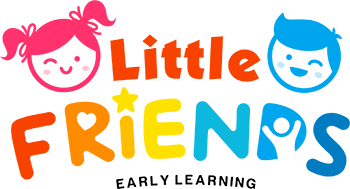Early Years Learning Framework (EYLF)
Little Friends Early Learning takes on the Early Years Learning Framework approach to enrich our daily educational program and practice to encourage children’s growing sense and understanding of belonging, being and becoming.
What is the Early Years Learning Framework?
The Early Years Learning Framework is an early childhood curriculum framework, which will guide early childhood educators in developing quality, early childhood education programmes and practice within our early learning service. The framework describes the principles, practice and outcomes to support and enhance young children’s learning from birth to five years, as well as their transition into school. This will help ensure consistency in the delivery of early learning programmes and practice around Australia.
What are the key elements of the framework?
The Early Years Learning framework has a strong emphasis on play-based learning, as play is the best journey of delivery for young children’s learning and providing the most appropriate stimulus for brain development within these key early years.
The framework also recognises the importance of communication and language (including early literacy and numeracy) as well as social and emotional development in children as a key form of early development skills and knowledge.
The Early Years Learning Framework describes childhood as a time of belonging, being and becoming.
Belonging is the basis for living a fulfilling life.
Children feel they belong because of the relationships they have with their family, community, culture, and place.
Experiencing belonging- knowing where and with whom you belong- is integral to human existence. Children belong first to a family, a cultural group, a neighbourhood and a wider community. Belonging acknowledges children’s interdependence with others and the basis of relationships in defining identities. In early childhood, and throughout life, relationships are crucial to a sense of belonging. Belonging is central to being and becoming in that it shapes who children are and who they can become.
Being is about living here and now.
Childhood is a special time in life and children need time to just ‘be’ – time to play, try new things, and have fun.
Childhood is a time to be, to seek and make meaning of the world. Being recognises the significance of the here and now in children’s lives. It is about the present and them knowing themselves, building and maintaining relationships with others, engaging with life’s joys and complexities and meeting challenges in every day life. The early childhood years are not solely preparation for the future but also about the present.
Becoming is about the learning and development that young children experience.
Children’s identities, knowledge, understandings, capacities, skills and relationships change during childhood. They are shaped by many different events and circumstances. Becoming reflects this process of rapid and significant change that occurs in the early years as young children learn and grow. It emphasises learning to participate fully and actively in society.
The Early Years Learning Framework addresses five key learning outcomes:
Outcome 1 – Children have a strong sense of identity
It’s about experiences, especially positive ones including change and transitions where children:
- Learn about themselves
- Can feel significant and respected
- Grow confidence to explore and learn
- Have the right to be a child
- Shape their identity
Outcome 2 – Children are connected with and contribute to their world
When a child interacts and participates within groups they:
- Develop a sense of belonging
- Develop an understanding of their reciprocal rights and responsibilities
- Learn ways of being that reflect their family’s and community’s values, traditions and practices of their group
Outcome 3 – Children have a strong sense of wellbeing
Wellbeing refers to both physical and psychological aspects. It’s linked to resilience, giving children the ability to cope with day-to-day stress and challenges. It also includes:
- Physical health
- Happiness
- Social functioning
Outcome 4 – Children are confident and involved learners
Confidence to experiment and explore develops from:
- A sense of security
- Sound wellbeing
- Developing competence
- Becoming active and involved participants in learning
Outcome 5 – Children are effective communicators
Children communicate from birth. They use gestures, sounds, language and assisted communication. Positive experiences with families, communities and carers successfully develop their foundations in language, literacy and numeracy.
By using a range of tools and media, such as music, dance and drama, we can encourage children to express themselves and connect with others.
All elements of the framework, including principles, practices, and learning outcomes guide us and your child’s journey throughout our daily indoor, outdoor, and gathering programs and is captured in children’s developmental records and as well a key room documentation.
